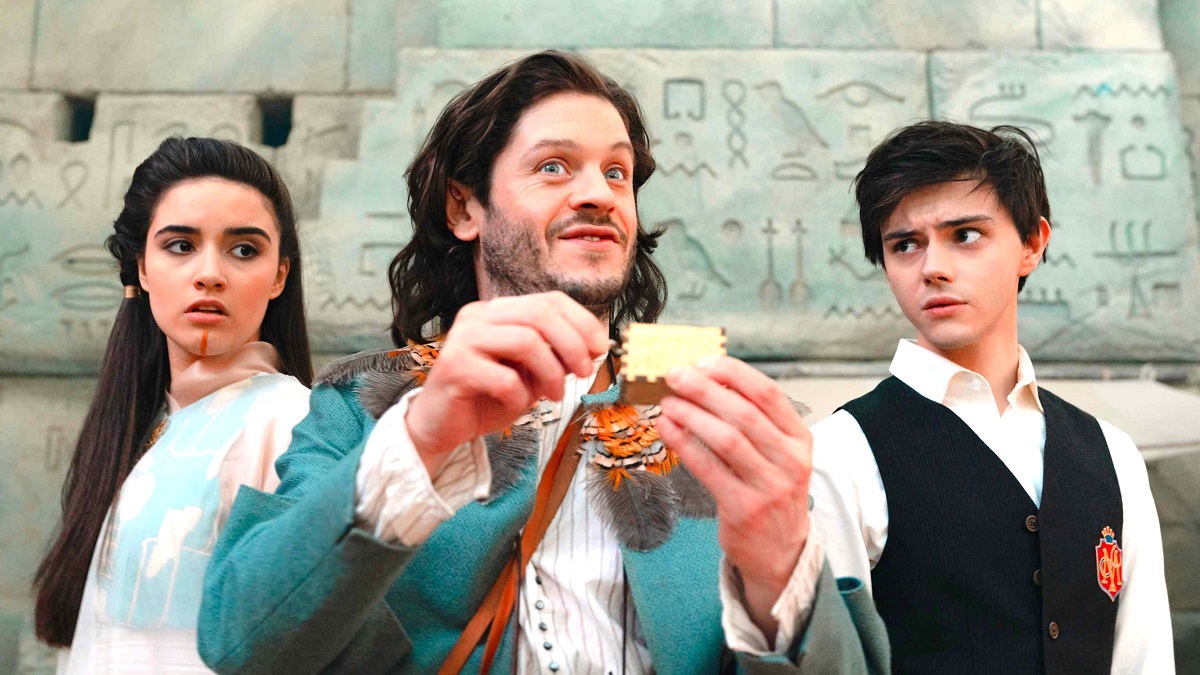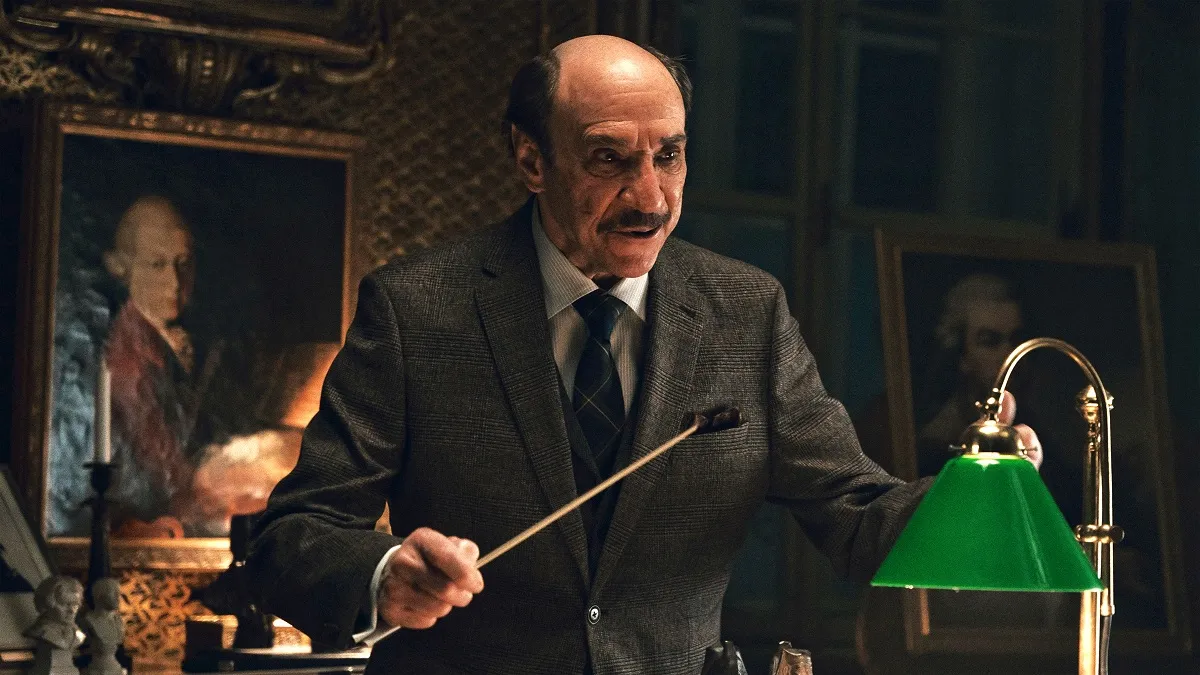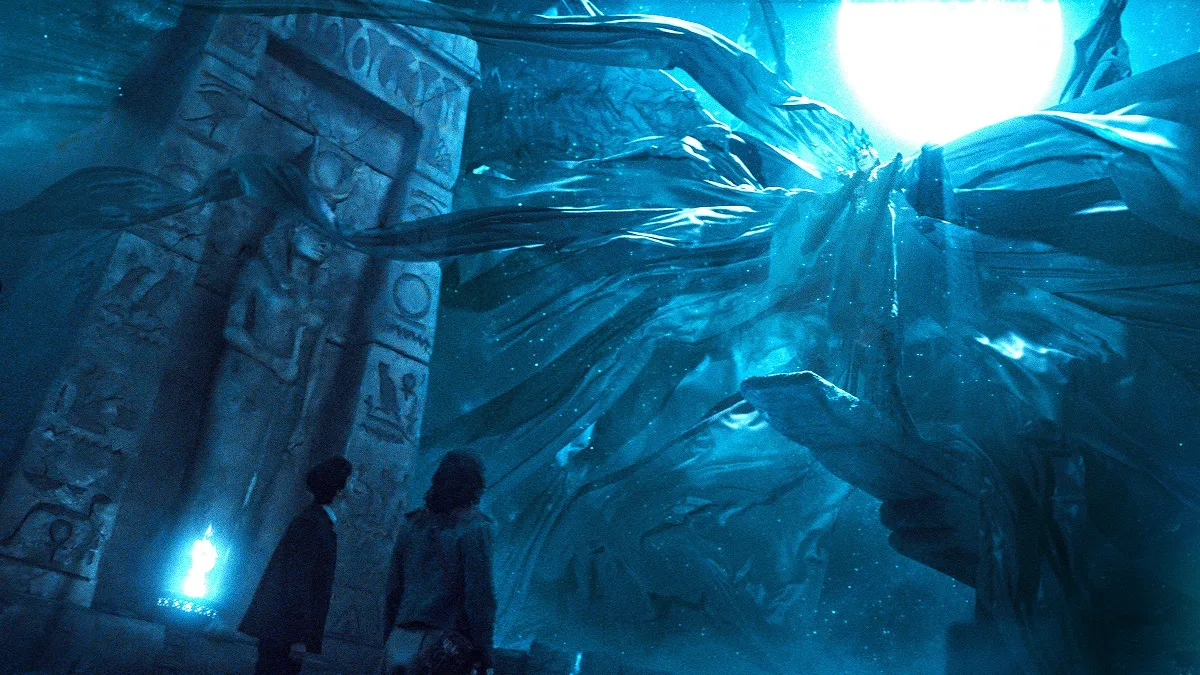As far as feature-length directorial debuts go, adapting a famed Mozart opera into a modern-day fantasy that features musical numbers aplenty, effects-heavy visuals, fantastical escapism, and a dash of romance sounds like a daunting task, but one The Magic Flute‘s Florian Sigl was well prepared for.
The filmmaker has a lifelong passion for classical music, so it makes perfect sense for his jump into the world of cinema to come with a project that speaks to him on a personal level. Repurposing the broad strokes of the 1791 opera, Jack Wolfe stars as Tim, who gets accepted into a prestigious musical academy where he instantly faces internal and external doubts over whether or not he should be there at all.
After discovering a gateway in the library, he finds himself pulled into The Magic Flute, brought to life as a lavish alternate reality where imagination has no limits. The film releases in theaters this coming Friday, and We Got This Covered had the chance to speak with Sigl about his ambitious undertaking.
During our chat, we cover his connection with classical music, bringing Academy Award-winning Amadeus star F. Murray Abraham back into the world of Mozart, walking a delicate tonal tightrope, and much more, which you can check out below.

You were first announced as the director of The Magic Flute back in November of 2017, so how does it feel almost five and a half years later to be just days away from release?
Incredible! You’re being taught by, actually, a lot of people that you meet that in the movie business that it really takes time to do. Especially movies with a theatrical release, and development, and the shoot, and financing, and stuff like that. And you say, “Sure, sure, yeah, it’s gonna take a long time.”
But then, you actually realize it’s really a long time! And you really have be clever, and pick the right projects, so that you really still enjoy working on them after five years. And I was really lucky in that case. It doesn’t feel real in a way. It’s like, there must be something, waiting on maybe it’s not being released, but I know it’s being released now. That’s why we’re talking! But it’s amazing. It’s a dream come true. And that’s not an easy line to say.
As far as feature debuts go, an expansive operatic fantasy based on a Mozart classic is an ambitious way to dive in at the deep end. What was it that spoke to you about The Magic Flute on both a personal and professional level – outside of being a lifelong classical music fan – that made you know this was a movie you had to make?
The opportunity that I could write the story myself, and I realized, “Okay, both hearts in me are being covered.” So on the one side, and I grew up in the 80s, with all the Spielberg movies and things like that; a huge Star Wars fan. And on the other hand, my first career was as a classical musician.
I actually wanted to become a bassoon player and conductor in a big orchestra. And I adore Amadeus, as a movie, because that was the first movie I’ve ever seen that managed to transport art – and especially music – into motions, and even classical music into motions, for people that have no idea about classical music.
I was so fascinated by that, and having the chance to combine these two genres. And hopefully, I think my mission is done if one of 100 kids watch the movie, if just one decides to play an instrument, or listen a little bit more to classical music. Fantastic. And then if the other ones have a great time and are being entertained, even better.

You mentioned your love of Amadeus, and you’ve got F. Murray Abraham in the cast, and I imagine it wasn’t lost on anyone that he famously won an Oscar for Amadeus, what was that like for both he as an actor and you as a filmmaker bringing him back into the world of Mozart?
Confusing? It’s like if you meet your hero or your dream woman or something like that! Just because there’s such an aura. And I got to talk to him. I remember the first talk we had that was via Zoom, and he was in his in his New York house. And that was already very impressive.
But then he came to Salzburg, and we started rehearsing and shooting in Salzburg, and all the newspapers in Salzburg – the city where Mozart lived – he was on the cover page! Every day they wrote, like, “Salieri is coming home”, and stuff like that. So even before he was there, and then meeting him, and understanding that he is an actor who 100 percent wants to deliver.
He’s super professional. He has such deep experience – especially in stage performances and Shakespeare – and working with him, that was the first time where I realized what a luxury it can be as a director to work with such a talented and experienced actor, because it’s like a completely new thing.
And it was very enjoyable. And he’s a lovely guy. I think he enjoyed the shoot as well. At least he said so! So, no, it was a big honor and a big joy.
As well as being a musical, there are a lot of different genre elements in play – ranging from fantasy, adventure, and drama to romance and comedy – did you face any challenges during either development and production to strike the right balance and ensure that one didn’t end up overpowering the others?
Yes. And that was actually an absolute constant challenge. And, in each moment of the process in a different way. When you write the script it’s all theoretical, because you read it, but you don’t know. How, how much space? How strong is the impact gonna be? Then you shoot it, and you try to make everything in itself working and the best, but also try to keep the big art.
And then you go into the editing room, and you realize, “Okay, all the balancing you did so far, is a nice try, but you have to work on it even further.” And then the other challenge is… The first edit version of the movie was two hours, 45 minutes. So we lost almost 40 minutes in the editing process, because of several reasons.
Because at some point, you lose the attention of an audience. In theaters, movies shouldn’t be too long, even though lots of movies are very long. And we also wanted to approach a younger audience where, you know, two hours is really the limit, because then kids get bored, or they need to pee, or whatever. So that was really a challenge.
And it was mainly because the original opera is two hours, so I had to shorten that already, and make a decision on which songs do you keep, which parts of the story do you keep? And I knew when I was doing that, even with a supportive Mozarteum, that there’s always going to be somebody unhappy. Which is, yeah, which was a challenge.
And then with the stories in the real world, which I really wanted because I thought, “Okay, that’s the connection to a contemporary audience.” And that’s how kids that have no relation to opera, at least, find a way into that movie. How do you keep those storylines? And how do you give them a satisfying end as well? So that was really a challenge in something we had to discuss a lot, and find the right way together with the producers. And also Roland [Emmerich, executive producer] was very involved in that process. So you can imagine lots of people try to help balance this out.

Debates about the subtext and symbolism of the opera have literally been going on for hundreds of years, did you ever feel tempted as both a classical music fan or filmmaker to wade into those waters, or was your focus always on telling the best possible version of your story?
I tried to combine both. Mainly because I think that operas in general are – most of the time, especially the Mozart opera – is about two things. One is love. All operas are about love. And the other one is about finding your place in society. Even if you look at other Mozart operas, then it’s like servant and aristocrats, the discussion.
Okay, Is that right or not? And of course, The Magic Flute has a focus especially on the Freemasonry, but it’s about initiation, and about when are you ready to become part of society? And what’s your position in that society? And I think that’s the two themes that are in the movie everywhere. It’s like, how important is love and what is real love? What’s brotherly love? What versions of love are there? And on the other hand, what’s my position in society?
And is that position a given fact is it like Murray say as Dr. Longbow that “you know, “everything in universe is calculated and pre-decided,” or is a free will and can you choose? And can you choose your own position? So it’s very simple, actually, it’s coming of age, finding your position, and it’s love. I think!
Calling The Magic Flute a modern-day retelling of a Mozart opera doesn’t really do it justice, because it’s been transformed into a broad and accessible fantasy that’s going to appeal to a much wider audience, but what do you want audiences to take away from the movie by the time the credits come up?
That they really had a good time the last two hours, that they experienced some some of the basic human emotions like fun and love and mystery, and that they maybe learned something, but mainly that they had a good time, and that they enjoyed themselves. And that this was entertaining, even though they listen to more than 40 minutes of classical music!
If you could direct any project of your choosing – as in, someone offers you anything you want without restrictions – what would it be and why would it be that?
Oh… That’s… that’s a tricky question! I think it would for sure be something where… I’d love to discover a new world with the audience, and a very visually stunning and emotionally, you know, like, attractive world. I have a very deep love of Asian cinema. And I think some – especially some of the stories Kurosawa did – have some angles and have some perspectives that would be worth looking into again. Yeah, probably something like that. So leaning into Asian cinema and stuff, really discovering a new world.
The Magic Flute releases in theaters this Friday, March 10.











Published: Mar 8, 2023 12:04 pm